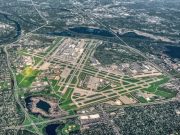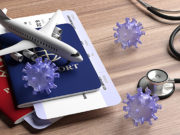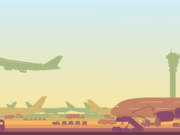The views expressed are the author’s and do not necessarily reflect those of Flight Safety Foundation.
Because of the COVID-19 pandemic, some governments in Asia have, for almost two years, implemented strict policies affecting flight crewmembers, including stringent quarantine requirements while away from their base and also upon their return, and draconian methods to prevent any form of human interaction even after vaccination and testing.
Rules for layovers are simple, and most of them state that crewmembers cannot leave their hotel rooms and cannot receive visitors. On the other hand, the home quarantine rules are complex and have changed multiple times over the last 21 months. The strictest conditions were imposed by a handful of jurisdictions, including Taiwan, Hong Kong and China. Working conditions are characterized by a back-to-back cycle of flight duty times of up to 20 days, followed by several days of quarantine, leaving crewmembers with only a few days a month to be outside and interact with their families and friends.
In Taiwan, for example, it is forbidden for crewmembers to attend public gatherings or visit restaurants, movie theaters and hospitals/clinics during their days off.1 Some hospitals even refuse to treat family members who were in close contact with crewmembers within the previous 21 days.
And in Hong Kong, where Cathay Pacific Airways pilots have said strict rules are a risk to their mental health, news reports said that the airline fired three pilots who violated company rules by leaving their hotel rooms during a layover in Frankfurt, Germany; the three later tested positive for COVID-19. One report quoted Cathay Pacific as saying the cargo pilots were fired because of an unspecified “serious breach” of rules.2,3 The government subsequently sent more than 270 of their family members and others to a state quarantine camp.
Symptoms of Anxiety
A Kaiser Family Foundation (KFF) study found that four in 10 adults in the United States reported symptoms of anxiety or depressive disorders during the pandemic. Another KFF poll reported negative impacts on individual mental health, including difficulty sleeping or eating, increased alcohol consumption and worsening chronic conditions caused by worry and stress over the virus.4
In Hong Kong, a May 2021 study of individuals under quarantine reported that the most common effects were persistent feelings of fear, anxiety, anger, exhaustion and lack of energy.5 In China, a study of the mental health of medical workers found similar reactions due to isolation, including frustration and discrimination (against medical personnel); the study found that these reactions affected the medical workers’ ability to pay attention, to understand and to make decisions.6
Studies have found the same reactions within different groups of people, so it seems clear that crewmembers also are susceptible to the negative impacts of quarantine, including long-term effects such as post-traumatic stress disorder, depression and insomnia.7
A study conducted by the Department of Psychological Medicine at King’s College London and published in The Lancet identified several stressors associated with quarantines, including:
- The duration of the Longer quarantines were associated with poorer mental health.
- Fear of infection, including fear about one’s own health and fear of infecting others – or fear of being isolated for months in a quarantine hospital in case of testing positive for COVID-19.
- Frustration and boredom, caused by reduced social and physical contact with others, and a feeling of isolation from the rest of the world.
- Inadequate supplies. Having inadequate basic supplies, including accommodations, was found to be a source of frustration and can be associated with anxiety and
- Inadequate information. Poor information or lack of information from public health authorities, insufficient and unclear guidelines, and confusion about the purpose of the quarantine can fill a human with uncertainty and fear.8
In connection with the last point, in some parts of Asia, members of the public have expressed fear of crewmembers, whom they believe have been responsible for COVID-19 outbreaks.
In a September news report, a pilot described his experience with the local community, saying, “People are thinking the pilots are murderers because we brought back the virus.” The pilot described a “witch hunt” atmosphere fueled by online hate and bullying, including comments wishing death to pilots.9
If countries continue to isolate crewmembers for months to come, the probability of serious mental disorders such as depression and anxiety will increase, along with physical problems caused by lack of exercise.
Another active threat to aviation safety is the reduction of human performance caused by the common reactions to a quarantine, such as lack of sleep, worry, frustration and stress. These effects probably will not result in grounding a flight crewmember but could contribute to the pilot’s cumulative fatigue. Consequently, a flight crew that has had all its members subjected to harsh quarantine rules will operate in an environment more prone to operational mistakes and slow reaction times during critical phases of flight.
Human Performance
Harmful reactions to quarantines can be divided into three categories:
- Physiological factors – Maintaining a healthy exercise schedule during isolation sometimes can be challenging. Mental Health America says that a lack of exercise is associated with the risk of cognitive decline and 10 In addition, a survey of individuals undergoing quarantine in Hong Kong has shown that participants experience physical effects such as back problems, muscle ache and brain fog during their periods of quarantine.11
- Psychological factors – Some factors that can negatively affect an individual’s mental and emotional state are anxiety and stress, factors that the U.S. Centers for Disease Control and Prevention says are associated with quarantines.12 There is also supporting evidence that more extended quarantines are associated with harsh psychological consequences, and their impact is wide-ranging, substantial and long-lasting.13
- Psychosocial factors – Being under constant quarantine forces an individual into unwanted solitude. This social isolation can become unhealthy, affecting a range of mental and physical factors. Loneliness is associated with anxiety, depression and suicide rates, and also to poor cardiovascular health and cognitive function.14
Life in quarantine can lead to deterioration of human performance. This decline has not been categorized in aviation, but since it could affect alertness, mental and physical performance, it may be linked to fatigue, which decreases short-term memory, leads to an increase in human error and decreases attention span.15
Furthermore, we can deduce that significant personality traits correlated to human performance, such as attitude, judgment and decision-making, will also be affected.
Are pilots undergoing harsh quarantines fit for duty? U.S. Federal Aviation Regulations Part 117.3 defines fit for duty as “physiologically and mentally prepared and capable of performing assigned duties at the highest degree of safety.” A short term of harsh quarantine rules will probably not disqualify a pilot from being fit for duty, but where will regulators draw the line? Are 21 months of harsh rules for crewmembers in some Asian countries close to the limit, or have they already crossed a line? More studies and surveys will be required to answer these questions.
Reporting fatigue and mental and emotional issues that will disqualify someone for duty is essential, but this also imposes stress on crewmembers in the form of fear of being disciplined for calling in sick or fear of affecting their medical certification.
Overcoming Negative Consequences
Some practices can help individuals decrease the negative consequences of quarantine. Recommendations call for frequent workouts or short walks around the area of confinement, setting alarms for mealtimes and other activities, enjoying the fresh air (if the window can be opened), and using time to meditate and unplug from social media.16 Other recommendations from The Lancet research call for keeping quarantines short, giving people as much information as possible and making the experience tolerable for the individual.
Governments must implement balanced quarantines to protect society from the virus and also to safeguard the mental and emotional health of the individuals under quarantine.17
Pilot unions are currently lobbying for changes, but some Asian countries have little flexibility when discussing quarantine rules. Support from international organizations may help to encourage change.
Additionally, if operational mistakes increase, Asian airlines should reduce their punitive actions and be more open to a just culture. This change is essential in reducing stress on crewmembers and obtaining more safety-related data to measure and mitigate threats associated with quarantines. Airlines could also use this data to add “quarantine fatigue” to their fatigue risk management systems. Ultimately, however, it is up to the crewmembers to educate themselves about quarantine risks, recognize them and, if necessary, seek professional help.
Alain Mazatan Trevino is a first officer in the Boeing 777 for a Taiwanese airline. He holds an MBA and a bachelor’s degree in safety science from Embry-Riddle Aeronautical University.
Notes
- Smith, N. “‘People Think Pilots Are Murderers Because We Brought Back the Virus:’ Taiwan’s COVID Scapegoats.” The Telegraph. Sept. 10, 2021. Retrieved Oct. 29, 2021, from https://www.telegraph.co.uk/global- health/science-and-disease/people-think-pilots-murderers- brought-back-virus-taiwans-covid/
- Freed, Jamie. “Locked in: Hong Kong COVID Rules Take Mental Toll on Cathay Pilots.” Reuters. Nov. 26, 2021.
- Reuters. “Cathay Pacific Fires 3 Pilots Infected with COVID-19 on Layover.” Nov. 18, 2021.
- Kamal, R.; Panchal, N.; Cox, C.; Garfield, R. “The Implications of COVID-19 for Mental Health and Substance Use.” July 20, 2021. Kaiser Family Foundation. Retrieved Oct. 29, 2021, from https://www.kff.org/coronavirus- covid-19/issue-brief/the-implications-of-covid-19-for- mental-health-and-substance-use/
- Blaine, Judith. “Exploring the Psychosocial Consequences of Mandatory Quarantine During the COVID-19 Pandemic in Hong Kong.” Psychology and Behavioral Sciences Volume 10, (Nov. 2, 2021): 96‒103. Doi: 10.11648/j.pbs.20211002.13
- Kang, L.; Li, Y.; Hu, S.; Chen, M.; Yang, C.; Yang, B.X., et al. “The Mental Health of Medical Workers in Wuhan, China, Dealing With the 2019 Novel Coronavirus.” The Lancet Psychiatry. Feb. 5, 2020. Doi.org/10.1016/S2215-0366(20)30047-X
- Blaine.
- Brooks, S.; Webster, R.; Smith, L. et al. “The Psychological Impact of Quarantine and How to Reduce It: Rapid Review of the Evidence.” The Lancet Volume 395 (Issue 10227, Feb. 26, 2020): 912‒920.
- Smith.
- Mental Health America. “Risky Business: Exercise Extremes.” Retrieved Oct. 30, 2021, from https://www.mhanational.org/risky-business-exercise- extremes
- Blaine.
- U.S. Centers for Disease Control and Prevention. “Coping With Stress.” July 22, 2021. Retrieved Oct. 31, 2021, from https://cdc.gov/mentalhealth/stress-coping/cope-with-stress/index.html
- Brooks, Webster, Smith et al.
- Tulane University School of Public Health and Tropical Medicine. “Understanding the Effects of Social Isolation on Mental Health.” Dec. 8, 2020. Retrieved Nov. 1, 2021, from https://publichealth.tulane.edu/blog/effects- of-social-isolation-on-mental-health/
- Cusick, Stephen K.; Cortes, Antonio I.; Rodrigues, Clarence C. Commercial Aviation Safety, Sixth Edition (p. 97‒101). McGraw-Hill Education. Kindle Edition.
- Gutterman, A. “Quarantine Fatigue is Real: Here’s How to Deal With It.” Forbes. Nov. 3, 2020. Retrieved Oct. 30, 2021, from https://www.forbes.com/sites/ellevate/2020/11/03/quarantin e-fatigue-is-realheres-how-to-deal-with- it/?sh=4345e2b21c04
- Brooks, Webster, Smith et al.


